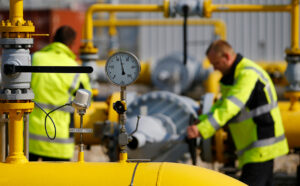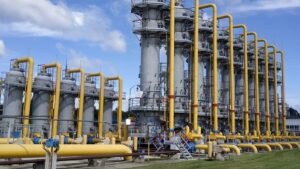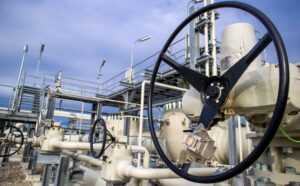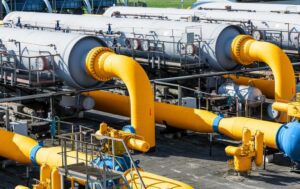
Austria is preparing for a possible cessation of Russian gas if its transit through Ukraine is stopped, Federal Chancellor Karl Nehammer told reporters in Chisinau.
“We are constantly preparing for serious challenges. That is why our storage is already 75% full. And we are also negotiating with those who have new volumes of gas. If Russian gas runs out completely, OMV is already working on that,” he said.
Asked whether he would talk to Ukrainian President Zelensky about it, Nehammer said: “This is not the main topic today. It’s about the war in Ukraine. But it’s always an issue of security of energy supply, which is on Austria’s agenda. So it is always a topic that is taken into consideration.”

Ukrtranshaz JSC, the operator of Ukraine’s underground gas storage facilities, has started the gas injection season as part of preparations for next winter, Naftogaz of Ukraine board chairman Oleksiy Chernyshov said.
“Now gas is being accumulated for the next heating season 2023/2024. Due to favorable weather conditions, the previous season of gas withdrawal from underground storage facilities was one of the shortest in Ukraine in recent years,” he wrote on his Facebook page.
Chernyshov also specifies that during the period from October 7, 2022, to mid-April 2023, 5.572 billion cubic meters of gas has been withdrawn from Ukrainian underground storage facilities.
As reported, at the beginning of March 2023, Naftohaz said in a presentation by the company to holders of defaulted Eurobonds that 13.9 billion cubic meters of natural gas was used during the heating season 2022/2023, of which 1 billion cubic meters was imported, 5.3 billion cubic meters – gas lift from UGS, and 7.6 billion cubic meters – extraction by Ukrhazvydobuvannya.
At the beginning of March 2023 there were about 10 billion cubic meters of gas in the Ukrainian underground gas storages, the NJSC sets a task to accumulate at least 15 billion cubic meters of gas in the storages by the beginning of the season 2023/2024.
The system of 12 underground gas storages of Ukrtransgas, which is 100% owned by Naftogaz of Ukraine, has a total nominal capacity of 31 billion cubic meters. m, and includes Bilche-Volytsko-Uherske UGS (17.05 billion cubic meters), Uherske (1.9 billion cubic meters), Dashavske (2.15 billion cubic meters), Oparske (1.92 billion cubic meters), Bogorodchanske (2.3 billion cubic meters), Krasnopartyzanske (2.5 billion cubic meters). The following three categories of cu.m. are currently under review: Krasnopartyzanske (1.5 bcm), Solokhivske (1.3 bcm), Olyshevske (0.31 bcm), Proletarske (1 bcm), Kehychivske (0.7 bcm), Krasnopopopivske (0.42 bcm) and Verhunske (0.4 bcm) located in the temporarily occupied territory.)

Gazprom’s bid for gas transit through Ukraine has increased to the maximum for the last month (since January 15).
“The operator of Ukraine’s gas transmission system (OGTSU) said it had accepted a transit request from Gazprom for Wednesday in the amount of 35.8 million cubic meters. The figure on Tuesday was 30.8 million cubic meters. The capacity is claimed for only one of the two entry points into the country’s GTS, the Suja gas metering station. No application has been accepted for the corridor through the Sohranovka gas metering station.
The current level of gas reserves in Europe has fallen to 65.66 percent, 20 percentage points above the average for the same date in the last five years, according to the Gas Infrastructure Europe (GIE) association. During the Feb. 13 gas day, inventories were down 0.45 percentage points.
Warm weather in October, November and January as well as austerity measures have resulted in UGS reserve levels now at their highest ever recorded. This strengthens confidence of the authorities in the successful passing of the winter.
Europe’s LNG receiving terminals operated at 62 percent capacity in January, nearly the same in the first days of February. At the same time the level of LNG inventories in the tanks of receiving terminals is decreasing more and more. This suggests that the inflow of new LNG cargoes to the region is falling amid low prices and competition from Asia.
The day-ahead contract at the TTF hub in the Netherlands added just over a percent in the past 24 hours, closing at $592 per thousand cubic meters.
The “Asian premium” is stable. – gap between gas prices in Asia and the price of LNG supplies to Europe. March futures for JKM Platts (Japan Korea Marker, reflecting the spot market price for cargoes supplied to Japan, South Korea, China and Taiwan) traded at $639; futures for LNG supplied to North West Europe (LNG North West Europe Marker) traded at $582.
The state of U.S. UGS reserves is becoming increasingly important to the global market as the country is actively ramping up exports.
In the regular reporting week (ended Feb. 3), reserves fell by 6.1 bcm. For the first time since the beginning of the year, weekly withdrawals exceeded the average for the last five years.
The current reserve level is 49%, 5 percentage points above the five-year average, according to the U.S. Department of Energy’s Energy Information Administration (EIA).
February promises to be a cold month in the country, which will lead to an increase in energy spending for heating. On the other hand – America’s largest LNG plant, Freeport LNG, is still delaying its restart after an accident, leaving gas that was supposed to go to exports in the domestic market.
So far, the EIA has projected that storage inventories will fall by 60 billion cubic meters this winter (the average for the last five years). At the end of March, natural gas volumes in storage are projected to be 40 billion cubic meters. This is 8% below the five-year average.

Company-trader “Ukrzaliznytsia” – “Energo Sales Trans” – in January for the first time bought natural gas for the needs of the production enterprises of UZ without intermediaries, which allowed to reduce the price to 18.6 thousand UAH per thousand cubic meters, the Ministry reported on Facebook page on Saturday.
“The cost of gas came out more than 25% lower compared to the prices at which the enterprises of the structure of JSC “Ukrzaliznytsia” bought natural gas at the end of last year through private suppliers. The new price was 18.6 thousand UAH per thousand cubic meters”, – the words of Deputy Prime Minister – Head of the Ministry of recovery Oleksandr Kubrakov are given in the message.
According to him, the next step will be the direct purchase of natural gas from the producers directly to the needs of JSC “Ukrzaliznytsia”.
Kubrakov recalled that in 2021 “Ukrzaliznytsia” was allowed to buy electricity from “Enerhoatom” and other subjects of state generation for the period up to 3 years under a special simplified procedure. In addition, in 2022 the government allowed Ukrzaliznytsia to purchase oil products directly under foreign economic contracts.
The weighted average price of natural gas on the Ukrainian Energy Exchange on 28 January was 19,950,000 hryvnyas per 1,000 cu.m.

The operator of Ukraine’s gas storages Ukrtransgas JSC planned to perform overhaul of 10 wells and also work on intensification of 20 more on one of the West Ukrainian underground gas storages (UGS) in 2023.
“Well workovers continue these days at one of the West Ukrainian UGS facilities. The overhaul crew has completed work on the facilities renewed since 2022 and has begun new work,” the company said in a telegram on Wednesday.
“Ukrtransgas”, in particular, started a thorough inspection of the systems at two wells of the gas storage facility and, if necessary, will replace its individual elements. The aim of the works is to restore the productivity of these wells to the designed indicators and increase safety of their further operation.
“It should be noted that in 2022 about 20% of the well stock of this subway well was repaired”, – informed the JSC.
Last year the specialists of the UGSF overhaul group replaced the system components such as stop valves, flowing valves, core heads, etc., tested the tightness of joints and conducted a complex of geophysical studies to ascertain the serviceability and reliability of the wells.
“The performed repair works allowed increasing the calculated productivity of the wells by 11%, improved safety and reliability of gas storage in UGSF, stability of its withdrawal and injection in the future”, – summed up in “Ukrtransgas”.

PJSC “Ukrnafta” in November-December 2022 has resumed sales of natural gas at the exchange auctions.
“In November-December, the company sold 17.1 million cubic meters of blue fuel on the platform of the Ukrainian Energy Exchange,” the company said in a press release on Thursday.
Besides, “Ukrnafta” also intensified its work at the market of natural gas supplies to the final consumer, the PJSC noted.
As Ukrnafta director Sergii Koretsii (who took over from Oleg Gez on November 10, 2022) said in an interview with Interfax-Ukraine in late December 2022, the company plans to sell its own gas reserves in the underground storage facilities in the total volume of over 500 mln cubic meters at the exchange and/or through direct contracts.
According to him, Ukrnafta also plans to actively enter the market of natural gas supplies to end consumers.
“Just for the sake of understanding, the company used to have only five customers under direct contracts. Now we plan to become a reliable long-term partner both for large industrial enterprises and for businesses that need small volumes,” said Ukrnafta’s director.
As reported, Ukrnafta in 2021 reduced oil and condensate production by 0.1% compared to 2020 – to 1.499 million tons, gas – by 0.9% – to 1.117 billion cubic meters, but increased the production of liquefied gas by 1% (1.2 thousand tons) – to 117.7 thousand tons.
On November 5, 2022, the Supreme Commander in Chief decided to confiscate Ukrnafta shares (except for the controlling interest in Naftohaz Ukrainy) as state property during the martial law. Before the seizure, the structures of Ihor Kolomoyskyy and Hennadiy Boholyubov owned about 42% of Ukrnafta shares.
“Ukrnafta owns 85 special permits for production of hydrocarbons. On its balance sheet there are 1809 oil and 153 gas wells. The company owns 537 gas stations, of which 449 were in operation at the end of December 2022. The rest were either damaged as a result of military operations or are located in the temporarily occupied territories.